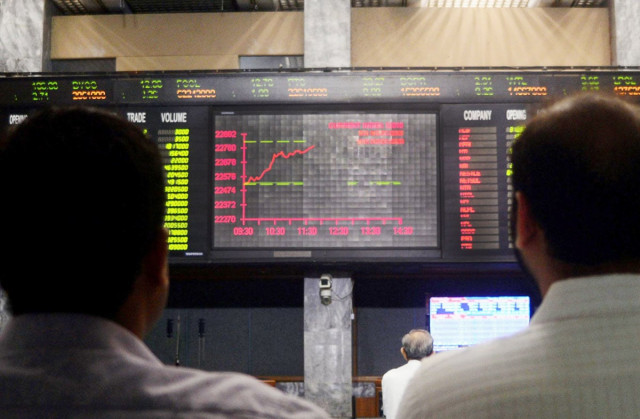Banks trading cheap, likely to lead KSE’s surge this year
In FY13, bourse rallied 48%, led by cement, energy and FMCG stocks.

“Banking stocks are going to go up because other sectors are getting saturated,” says Najam Ali, CEO of Next Capital PHOTO: AFP
With many analysts now predicting a slowdown in the price appreciation in these stocks after a bullish run that has lasted a year and a half, investors wonder which sectors are now going to lead the projected increase in the KSE index in coming months.
“Banking stocks are going to go up because other sectors are getting saturated. Cement and oil have had a long rally but banks, in my opinion, are still trading very cheaply,” said Najam Ali, CEO of Next Capital, a Karachi-based brokerage house, while speaking to The Express Tribune in a recent interview.
Shares of many banks are currently trading below their book value, which I find highly unusual,” he said, while referring to the net asset value of a bank. In other words, Ali is of the opinion that many stocks in the banking sector are under-priced at present.

“In booming stock markets, banks trade at a multiple of their book value – sometimes, two to three times their book value. I believe that despite a low monetary policy rate, which has declined substantially in the last few years, banking stocks are still very cheap,” he said.
Data shows that stocks of many banks with strong asset bases are indeed trading below their book value, which is the value at which they carry their assets on their balance sheets.
For example, Faysal Bank’s book value per share, according to its results for the first quarter of 2013 – the latest quarter for which financial results are available – is Rs20.57. In contrast, it traded at Rs10.42 a share at the end of trading on Thursday.
Similarly, the book value per share of Habib Metro Bank, according to results for the first quarter of 2013, is Rs23.60. But its share price was only Rs18.40 when the stock market closed on Thursday.
Another example is Askari Commercial Bank, which has a book value per share of Rs17.80 as per its latest financial results. However, its closing price on Thursday was Rs15.51.
There are some banks, mainly the large ones, whose stocks are currently trading at a price that is higher than their book value. One such example is Bank Alfalah. Its market price was Rs19.68 per share at the end of trading on Thursday.
The bank’s book value is Rs17.80 per share, according to the latest financial results, which is slightly below its current market price.
“Over the next year (FY14), banking stocks are going to go up. Remember, if economic growth takes place in Pakistan, it will be through banks even if their spreads don’t improve,” Ali noted.
Index to touch 28,000 points
Ali says two days after the May 11 general election he had predicted that the KSE-100 index would go up to 30,000 points within a year. He says it’s easily achievable, given how vibrant the Pakistani economy intrinsically is.
“It is unfortunate that we see only the index, and not the price to earnings multiple, which is not more than 8.5 times at the moment. The market is immensely cheap now compared to five years ago,” he said. According to Next Capital’s calculations, if the PE multiple is to go from 8.5 to 10, the KSE-100 index needs to rise by 4,500-6,000 points by December.
Published in The Express Tribune, July 13th, 2013.
Like Business on Facebook, follow @TribuneBiz on Twitter to stay informed and join in the conversation.



















COMMENTS
Comments are moderated and generally will be posted if they are on-topic and not abusive.
For more information, please see our Comments FAQ